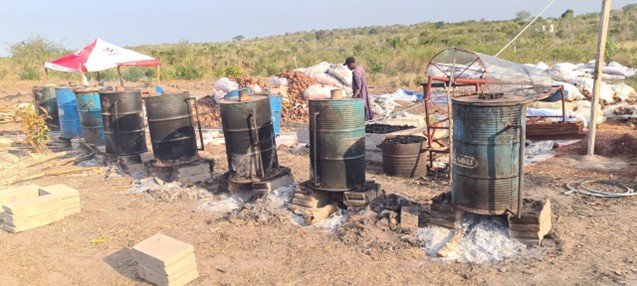The main utility of this innovation is to use wastes to produce alternative charcoal. The women and youth groups will be trained, empowered and supported to produce alternative charcoal. The intervention will contribute to reducing dependence of the community on biomass as the main source of energy.
ECO HUB Tanzania

We are facing climate change as a global challenge that is affecting people and the environment. The war against climate change ought to embrace collaborative initiatives and strategies to reduce the impact and to adapt to the impacts. Source of energy was mentioned as one amongst the accelerators of climate change especially cutting down trees as a source of energy for domestic use. Alternative charcoal is an substitute energy source aimed at addressing dependence on charcoal as the main source of energy for cooking. The initiative involves the local community by making them aware of how to make and produce charcoal using wastes in the context of clean energy.
This intervention attempts to employ local innovations and simple models to be adopted by the local people in the community. The initiative is pioneered by ECO HUB under the leadership of Madam Sarah Pima. The target market is always the local community especially women, young entrepreneurs; but sometimes the initiative was taken for international showcasing. The business model, they always employ, is to supply to users and searching for tender. The main competitor of this innovation is charcoal in the market. ECO HUB always organizes awareness sessions on the importance of using alternative charcoal to the environment and health at large, its quality and capability of completion and cost also as one Kg of alternative charcoal is 800 which is less compared to the conventional charcoal, which is sold up to 1200 per kg.
The initiative has impacted the community significantly. Testimonies indicate that there is a decrease of dependence on dirty charcoal and shifting to the use of alternative charcoal especially for entrepreneurs. Also, the innovation has simplified life for women who used to walk a long distance in search for firewood and now they can make their own alternative charcoal. About seven villages and about 250 young people and women have been trained and sensitized about the importance of making and using alternative charcoal.
This innovation is not complicated as it can be easily adopted by the local people if trained by experts. Since the innovation uses local materials, it is also cheap to implement and to adopt. The charcoal produced now increases the need from the local entrepreneurs especially (Mama Ntilie) for cooking. But also, currently the alternative charcoal is needed in public institutions like schools, prisons and others, which increases its demand in the market. The solution does align with national and international frameworks, and the existing policy and also complies to this framework. The innovation is more than three years old, which implies that it is acceptable and could be scaled up.
The innovators have managed to train members of the local community about the importance of using alternative charcoal. But also, to have branded alternative charcoal under the name of ECO HUB.
The innovation could be interesting if adopted in the whole community and this calls for the need for it to be scaled up. Therefore, the innovators should be trained on how to improve their solutions and supporting their initiatives especially in advocating and making people adopting the clean alternative energy. The innovation should be scaled up to other areas like big cities apart from Dar es salaam such as Mwanza, Arusha, Mbeya, Tanga etc.
There are more opportunities in this intervention as people and global initiatives move to the adoption of clean energy initiatives and expected the demand of the clean energy charcoal will also increase. The government of Tanzania has instructed the public institution to start adopting the used of clean energy for cooking. This will increase business opportunities related to this solution.

